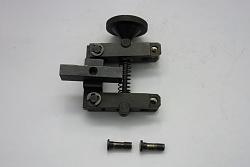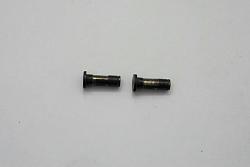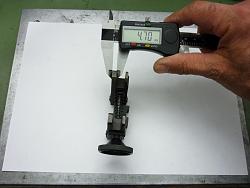I have one of the current clamp knurlers from LittleMachineShop. Very similar to many that
can be found on the net. The shaft pins for the rollers are simply installed with snap rings
and they wear fast. Also there is a lot of clearance on the width of the knurl wheel housings.
I replaced the pins (all 4) with shoulder bolts. 1/4" cap screw type worked out perfect.
They seem to be a bit tougher than the pins and you can reduce the side clearance
of the wheels and the arms. This increases the rigidity of the knurling tool. Don't take out
all of that side clearance, leave just enough for a smooth action. You could also make some
shim washers to remove that clearance and continue to use the original snap ring shafts or
still replace the pins with shoulder bolts.
The shoulder bolts are 1" long with the shoulder being about 5/8" long. You need to grind about
3 threads from each bolt to provide as much clearance to your lathe chuck as possible. I also
grind a flat on one side of each bolt. Keeps it from turning when tighting the nut and provides
the needed clearance for the bolt head to fit the knurler's arms.
Buy extra shoulder bolts for replacements when these new ones wear out. I consider them
consumables.
Cheers, JR


 LinkBack URL
LinkBack URL About LinkBacks
About LinkBacks


 Reply With Quote
Reply With Quote








Bookmarks